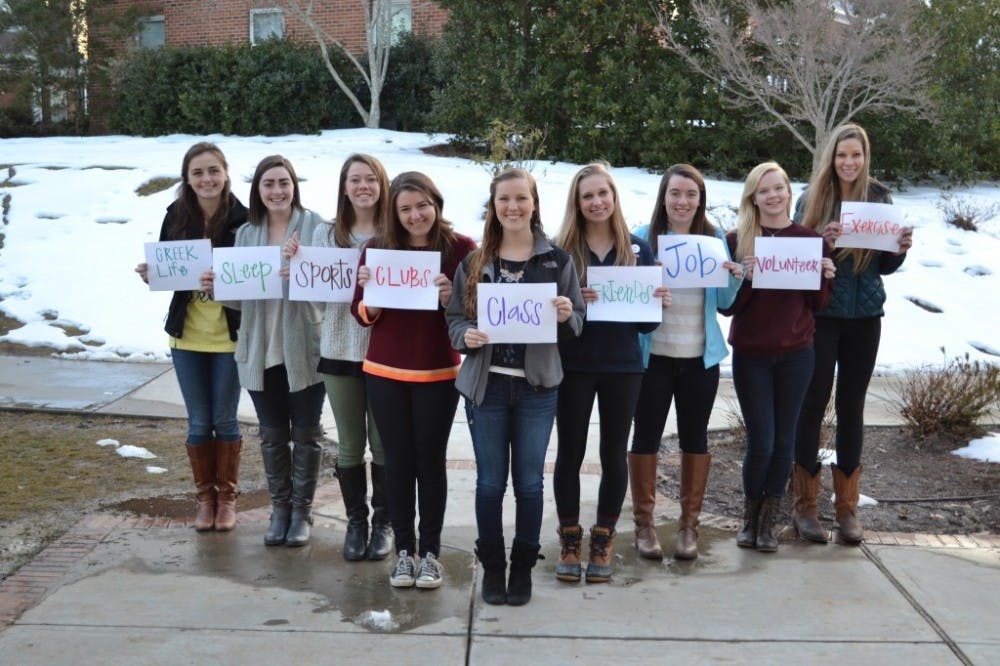This 2013-2014 school year, over 1,400 students left their hometowns and high schools behind to join Elon University’s Class of 2017. Ready or not, these young Phoenix became part of giant balancing act.
Juggling academics with jobs, leadership positions, research and a social life can be quite an overwhelming experience. Annie Phelan, a first-year psychology major, claims, “It was harder for me to devote time to school work. I wasn’t used to being around my friends all of the time in high school.”“College was the first time I really got away from my parents, said Jordan Palmer, a freshman finance and accounting major. “In high school, they used to tell me when to do things and when to come home. The first few weeks I kept staying up too late because I would hang out with friends, go to games or clubs and not do my work. Not having my parents around put pressure on me to stay responsible. However, as time went on, I was able to get a bearing on when to work and when to have fun. It’s a lot easier now.”
Josh Langel, a business management major agrees. “You need to really be able manage your time in college.”
However, Johanna Krygsman had an unusual advantage. “I went to boarding school, so I was already used to balancing a sport and extensive amount of school work, so coming to college and already knowing how to manage my social and academic life wasn’t that daunting.” Krygsman said.
In addition to adjusting to the transition of college, students who have already declared a major have to take both general education required courses and classes that count towards their major. Different majors have different expectations. For some majors, it’s more important to be involved in leadership positions and organizations in order to build a resume than to keep a perfect 4.0 GPA.
Emily Petersen, a devoted Education major and Honors Fellow, is involved in InterVarsity, Campus Outreach and the Student North Carolina Association of Educators. She also has an on-campus job at the Center for Leadership. Petersen aspires to be an elementary school teacher. “Leadership roles are a good way to have practice leading other students,” she said. “Good grades are nice to have, but, in the long run it’s not about who can do better on a test, it’s about having the knowledge and experience in a real life environment that makes the difference. Leadership roles and organizations help prepare for real life interactions.”
For some majors, a combination of leadership positions, extracurricular activities, and stellar academics are necessary. Freddy Suppes is the class of 2017 class president and a communications and political science major. “In order to pursue pre-law, you have to have a combination of both leadership positions within your organizations and high marks,” Suppes said.
Students who have already declared their majors understand what they have to do in order to be successful in their field of choice. For many students, this means understanding that academics can’t be the only consideration. Much like Suppes, Phelan also plans to be a well-rounded and balanced student by both building her resume and maintaining her grades. But Krygsman, a Biology major, keeps her list of extracurricular activities short so she can focus on maintaining her grades. “I think it’s more important for me as a bio major to keep up my grades because eventually I want to go to med school and I know that med school can be competitive,” Krygsman said.
It’s also valuable to listen to what Elon upperclassmen have to say. For example, Rebecca Schneider, a junior and Biochemistry major, plans on attending graduate school after graduation like many Elon students. Until recently, Schneider thought her outstanding GPA would be the most important factor in helping her get into a top graduate school and jobs in research.
“This year, I became very involved in one organization,” she said. “Being involved has helped me build relationships with people who have the same beliefs as me. I still see the importance of doing well in school, but for me that isn’t my top priority anymore. My top priority is to build relationships with others and be a leader within my organization to help other people.”
For Schneider, becoming a leader is not only a resume builder. She genuinely wants to help and give back to others. Becoming deeply involved in an organization or activity is a good way to show potential employers that you are invested and committed. Ben Perron, a senior accounting major, is expecting to graduate this spring. Believing that there is a balance between academics and activities, Perron became invested in a few things very deeply.
“Obviously, there’s the opposite danger of being overinvolved and spread too thin.” Ben explains. However, within his major, he feels that, “For future employers, leadership positions and activities are probably preferable.”
Why are leadership activities more preferable? “Because grades only show your ability to understand while leadership positions and activities show your ability to apply,” said Stephanie Carroll, a junior political science and international relations major. Carroll is currently involved in Campus Outreach, Periclean Scholars, Sigma Iota Row and Omicron Delta Kappa and is a second-year RA. In addition, she teaches horseback riding at a stable in Mebane. According to her, all of her leadership experiences in organizations and activities have paid off because she already secured her dream job for after graduation.
The transition from high school to college is a personal experience, but it seems the students in the class of 2017 are handling it well, each in their own way. Before they know it, these first-years will be juniors and seniors with plenty of leadership experience and extracurricular activities under their belts, which will help transition them into the professional world.


